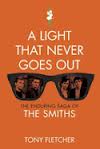
For a band whose dying gasp came over two decades ago, the Smiths' brief, entire career has been barely scrutinized. Initially there was the stodgy Severed Alliance by Johnny Rogan, which has long just about sufficed in the absence of anything more, and there has been a ceaseless, incoming tide of books about the songs, and the aura which surrounds their apostle-like leader, Morrissey, when all that was really required was a clear-headed history, a factual consideration, as to why they sprang into life. Tony Fletcher has finally created that with A Light That Never Goes Out, a reasoned, logical, and unhurried recreation of their initially unlikely route to fame.
Johnny Marr wasn't the only kid on the block who wanted to be a guitar hero, but he had immense talent on his side, along with street intellect and charm. The world of popular music is Jackson Pollocked with the exploded guts of grand intentions, and the lingering stench of all that might have been, turned sour. What is amazing was his ability to connect with another, equally ambitious soul, by simply beating a pathway to his door, casually strolling towards it, and knocking with the wish to write some songs. Morrissey, a bookish devotee of Oscar Wilde, the New York Dolls, and Sixties girl singers, had been idly loitering for such a call of fortune. There the fable could have ended, because many have dreamt thus and failed. However, within a matter of months they were releasing songs, garnering a devoted following, as they became akin to a beacon of hope for the eager lost souls of their generation.
Fletcher's success resides within his ability to recognize the value of the band's individual histories. By doing his research, and presenting it in a lively and dynamic way, he presents the almost inevitable route to fame taken by people who might otherwise not have been notable beyond their Manchester confines. One third of his diligent tome concentrates on the petri dish days of occasional letters to the press and other literary ambitions by Morrissey, and precocious sauntering into music on the back of Marr's blossoming abilities, and how along the way another two first-generation Irish Mancunians, Mike Joyce and Andy Rourke, completed the squaring of their circle. What emerges from this is a sense of something waiting for the moment to arrive, and when it did and all aligned, their spark into being, despite many potential disasters, flamed brightly, and whose ember still one quarter of a century later, provokes and inspires.
Morrissey remains one of the most inventive and literary lyricists of any generation, but the freshness of his outlook in a bleak and Thatcher-governed Britain is now almost lost because we have become accustomed to his way with words. His unapologetic vegetarianism influenced a generation via the Meat Is Murder album, and his choice of covers stars, mostly obscure (The Smiths never graced their own front of sleeve), was akin to a sharing of secrets. Being Smiths aware was to be included in a coterie, an education of sorts with a sense of positive exclusivity. Morrissey was the man who sold his world, the perfect and rare conclusion of a fan in waiting who finds himself iconic. Combined with Marr's ceaselessly inventive guitar work, and driven along by the restless powerhouse of Rourke and Joyce, they were a force, and one with a burgeoning influence that could and would not be denied, even though they said it, largely and emotionally, with flowers.
And so it couldn't last, but that it did for so long is in itself a testament to the power of creativity once unleashed. They never had a proper manager, held a quaint and Canute-like disdain for promotional videos, ragged their relationship with their record label Rough Trade, and if Morrissey didn't want to do an interview, or even embark upon a tour, he simply didn't show up. Fletcher steers his way through this and more, without the need to proffer judgment or to take a stand. He presents the narrative, and leaves readers to inform their own opinions. When it all grinds to a halt, Morrissey again in absentia and his three band mates exasperated in a chip shop, it couldn't be a more parochial, nor therefore appropriately English setting, a terribly suitable place for all to end.
With hindsight the creative marriage and friendship between Morrissey and Marr couldn't withstand the outside influences of success and excess. Marr gradually became a victim, albeit a genial and largely rational one, of the rock 'n' roll lifestyle. Morrissey, naturally insular, felt the endless pressure of being a spokesman for his generation, when he was only really expressing himself. Rourke went from a casual user to a near casualty, and only Mike Joyce seemed to remain remotely akin to the person he was upon arrival.
The Smiths had the literacy of the Kinks, the swagger of the Stones, the effeteness of T.Rex, and the eclectic nature of the Beatles, but such attempts to contextualize them fail to grasp their unique quality, or the intoxicating perfume of their genius. They had the luck to exist and connect, and in their wake have bequeathed a genuine treasure trove of inspired youthfulness. That is the light that continues to shine, even as their days succumb to amber.
